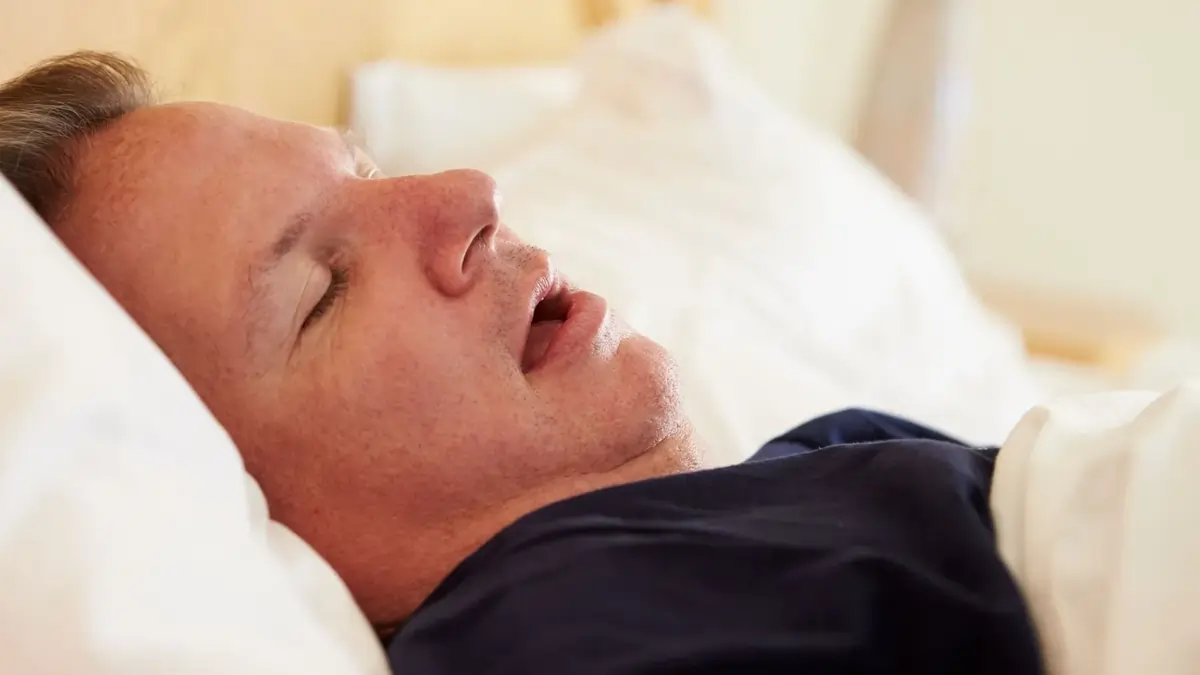How To Lose Weight With Sleep Apnea?
Introduction
Losing 5–10% of your body weight may help reduce or eliminate the symptoms of sleep apnea if you are overweight or obese. It can cause you to sleep less well and raise your risk of major health issues including stroke and heart disease.
However, there are steps you may take to assist your sleep apnea, such as decreasing weight if you are overweight or obese. To find out more about the connection between sleep apnea and weight management, continue reading.
What Is Sleep Apnea?
Those who suffer from sleep apnea, a very common disorder, have trouble breathing while they sleep. The most prevalent kind of sleep apnea, obstructive sleep apnea (OSA), is characterized by disrupted breathing due to a restricted or constricted upper airway. People who suffer from severe OSA may experience up to thirty breathing disturbances every night.
Numerous significant connections between sleep apnea and excess body weight are becoming apparent as the medical community gains more knowledge about the condition. In addition to causing sleep apnea, being overweight can aggravate its symptoms and intensify its negative health implications. Weight growth can also result from sleep deprivation, creating a vicious cycle. Numerous research indicates that weight loss helps sleep apnea, which is encouraging.
Does losing weight assist in the treatment of sleep apnea?
Although it may not remove sleep apnea for everyone, losing weight can undoubtedly help with it. This is the reason:
How sleep apnea is helped by weight loss:
Decreased fat surrounding the airways: Being overweight can cause your upper airway to constrict, particularly around the neck and abdomen. This fat can be reduced by losing weight, which will facilitate breathing.
Better lung function: Losing weight can increase the volume and airflow of the lungs, which will help with breathing as you sleep.
Decreased inflammation: Inflammation can exacerbate sleep apnea and is exacerbated by fat tissue. This inflammation can be lessened by losing weight.
According to studies, people who are overweight or obese can greatly lessen the severity of their sleep apnea by losing even a small amount of weight—between 10% and 15%. Some persons saw a complete resolution of their sleep apnea after losing a substantial amount of weight.
Instead:
Sleep apnea cannot be cured by losing weight. The degree of your sleep apnea, the amount of weight you lose, and your unique body composition are some of the variables that affect how effective weight loss is.
In addition to being overweight, other variables that might cause sleep apnea include age, genetics, and the anatomy of your head and neck.
How to proceed:
- Losing weight is strongly advised as part of your treatment strategy if you have sleep apnea and are overweight or obese.
- As directed by your physician, combine weight loss with additional sleep apnea treatments, such as CPAP therapy. While you’re trying to lose weight, this can help you control your symptoms and enhance your general health.
- For individualized guidance on weight reduction techniques and the most effective way to treat your sleep apnea, consult your physician.
- Keep in mind that losing weight can greatly reduce your symptoms and enhance your quality of life, even if it doesn’t cure your sleep apnea.
How can someone with sleep apnea lose weight?
While it can be difficult, weight loss with sleep apnea is certainly possible with the correct strategy. The methods that follow may be useful:
- Prioritize Sleep
- Focus on Diet
- Incorporate Exercise
- Ask for Help
Prioritize Sleep:
- Treat your sleep apnea: Using a CPAP machine or other recommended treatments will help you sleep better, feel more energized, and form healthy habits more easily.
- Create a consistent sleep plan: To enhance the quality of your sleep and aid your body’s natural sleep-wake cycle.
- Establish a calming nighttime routine: To relax before bed read a book, take a warm bath, or avoid using electronics.
Focus on Diet:
- Cut back on calories: To encourage steady and long-term weight loss, aim for a modest calorie deficit.
- Make whole foods a priority: Pick nutrient-dense, satisfying fruits, veggies, lean meats, and whole grains.
- Limit processed foods: These can make it more difficult to lose weight because they are frequently high in calories, bad fats, and added sugars.
- Stay away from late-night eating: Eating right before bed might interfere with sleep and make weight loss more difficult.
- Think about following an Italian diet: Weight loss and better sleep have been associated with this dietary pattern, which is high in fruits, vegetables, whole grains, and healthy fats.
Incorporate Exercise:
- Start slowly: Most days of the week, start with 30 minutes of moderate-intensity exercise, such as swimming, cycling, or walking.
- Enhance duration and intensity: As you become more fit, progressively extend the time and intensity of your workouts.
- Look for things you like to do: It will be simpler to maintain your fitness regimen over time if you find something you enjoy doing.
- Think about strength training: Gaining muscle mass can increase your resting metabolic rate and help you burn more calories.
Ask for Help
- Speak with your doctor: they can track your progress and offer tailored guidance on weight loss techniques.
- Join a member of a support group: Making connections with people who are attempting to lose weight and suffer from sleep apnea might inspire and motivate you.
- Think about getting expert assistance: Customized dietary and exercise advice can be obtained from a professional personal trainer or registered dietitian.
Additional Advice:
- Be patient and careful: It takes time and work to lose weight, so be consistent and patient. Don’t let failures deter you from changing your lifestyle in a lasting way.
- Monitor your progress: Keep an eye on your food intake, activity, and weight to maintain motivation and make any modifications.
- Honor your accomplishments: No matter how tiny your progress is, reward yourself for it.
- Recognize your accomplishments: You can reach your weight reduction objectives and enhance your general health and well-being by putting sleep first, paying attention to your nutrition, exercising, and getting help.
Remember, losing weight with sleep apnea is a journey, not a race. You can reach your weight reduction objectives while boosting your general health and well-being by putting your sleep first, giving attention to your nutrition, exercising, and obtaining treatment.
A lot of options have been created to help people lose weight. Success can result from certain program features, such as major lifestyle adjustments.
The techniques that typically provide the best results include:
- Behavioral treatment
- Increased physical activity or exercise
- A diet low in calories
Go for a healthy diet of roughly 1,200–1,500 calories per day for women and 1,500–1,800 calories per day for men if you alter your food intake.
Select a diet that you are likely to enjoy and maintain. Reducing your daily caloric intake is the key to weight loss, not the kinds of food you consume. Maintaining a diet that is well-rounded and healthy is beneficial for your overall well-being.
Make an effort to do a diet or lifestyle modification for at least six months. Because you would have developed healthy habits, losing weight gradually increases your chances of maintaining your weight loss.
Other recommendations consist of:
- Establish a healthy, long-term weight loss target, often 1-2 pounds each week.
- Don’t miss meals and try to eat three times a day.
- Observe how many calories you eat.
- Limit or stay away from highly processed foods and prioritize whole foods like fruits and vegetables. They may contain a lot of ingredients and sugar.
- Be sure to stay hydrated.
- Steer clear of or use fewer high-calorie condiments and sauces.
A doctor can suggest weight reduction medication or surgery if you need to drop a significant amount of excess weight and your efforts to do so have failed.
Physical therapy For Sleep Apnea
Physical therapy is not an effective cure for sleep apnea, but it can help regulate it, particularly among those with mild to moderately severe situations. Its main goal is to strengthen the upper airway muscles so that they won’t collapse as you sleep. The following represent a few examples of how physical therapy could assist with sleep apnea:
Oropharyngeal Exercises:
- The exercises that follow focus on the throat, soft palate, and tongue muscles.
- Their goal is to increase muscular tone, strength, and coordination so that the airway stays open while you sleep.
- Examples involve cheek puffing, neck tightness, and tongue exercises (such as pressing the tongue against the roof of the mouth).
Myofunctional Therapy:
- The goal of this specialist therapy is to improve the function of the face, tongue, and throat muscles by retraining.
- It can help strengthen the muscles that maintain an open airway, improve nasal breathing, and correct bad tongue position.
Breathing Exercises:
- Particular breathing exercises can strengthen the respiratory muscles and enhance lung function.
- This could decrease the intensity of sleep apnea episodes and increase airflow.
Postural Training:
- An open airway can be maintained with proper posture.
- Physical therapists can offer advice on the best posture and sleeping postures to encourage improved breathing as you sleep.
Physical therapy’s advantages for treating sleep apnea
- Can lessen sleep apnea’s severity
- Could lessen snoring
- Can enhance drowsiness during the day.
- May help people who find CPAP uncomfortable comply with it.
Important Points to Remember:
- Physical therapy is frequently combined with other sleep apnea therapies like oral appliances or CPAP therapy.
- Working with a licensed physical therapist who has treated sleep apnea before is crucial.
- Depending on the person and the degree of their sleep apnea, different results may be obtained.
If you’re thinking about using physical therapy to treat your sleep apnea, visit your healthcare provider or an expert in sleep medicine. They can direct you to a licensed physical therapist and assist you in deciding whether it’s a suitable course of therapy for you.
Conclusion:
In conclusion, rising, and losing weight is a useful strategy for treating sleep apnea, particularly for those who are obese or overweight.
Sleep apnea can be considerably improved by losing weight by:
- Reducing the amount of fat that grows over approximately the neck and throat, may block the airway.
- lowering inflammation and enhancing lung function.
- potentially lessening or, in certain situations, completely curing sleep apnea episodes.
FAQs
Is weight loss difficult for people with sleep apnea?
You may have heard that people with sleep apnea have a harder time losing weight. This is because it slows down your metabolism, which can sometimes make it impossible for you to lose weight at all.
Which type of exercise is best for people with sleep apnea?
Breathing Exercises for Sleep Apnea
Fake Yell.
Jaw Release.
Alternating Nasal Breathing.
Diaphragmatic Breathing.
Palate Stretch.
Hold a Spoon Between Lips.
Front-to-Back Tongue Slide.
Tongue Pushup.
Does losing weight aid in the treatment of sleep apnea?
Without any hesitation, losing weight can be a very successful treatment for sleep apnea, particularly for those who are obese or overweight.
Will losing weight cause my sleep apnea to go away?
Sleep apnea can undoubtedly be improved and, in certain situations, even eliminated by losing weight.
Which sleep apnea treatment is the most effective?
While being the most widely used and successful treatment for obstructive sleep apnea, some people find the mask irritating or disturbing. However, compared to their previous generations, the latest machines are smaller as well as faster. Additionally, several mask styles are available for each person’s comfort.
Which sleeping position is ideal for people with sleep apnea?
According to Salas, lying on your side or stomach will assist keep your airways open, which will lessen snoring and mild apnea.
Can my sleep apnea be cured by decreasing weight?
Even though it may not be a solution, decreasing weight can greatly reduce the symptoms of sleep apnea. It can, however, lessen the intensity of your ailment and enhance your general health.
What kind of diet works best for those with sleep apnea who want to lose weight?
It is advised to follow a balanced diet that emphasizes whole foods including fruits, vegetables, and lean protein. Reducing the consumption of processed meals, sugar-filled beverages, and excessive saturated fats can also help you lose weight.
When should I consult a physician about my weight loss and sleep apnea?
It’s crucial to speak with your doctor if you think you may have sleep apnea or are having trouble losing weight. They can evaluate your situation, provide suitable courses of therapy, and design a customized weight loss strategy.
Does sleep apnea respond well to any particular exercises?
Exercises that target the tongue and upper airway muscles may be beneficial in addition to general exercise, according to certain research. For particular advice, speak with your physician or physical therapist.
References
- Edwards, J. M. (2024, March 19). How Much Does Weight Loss Help with Sleep Apnea? Healthline. https://www.healthline.com/health/sleep-apnea/sleep-apnea-weight-loss
- Pacheco, D., & Pacheco, D. (2024, April 30). How weight affects sleep apnea. Sleep Foundation. https://www.sleepfoundation.org/sleep-apnea/weight-loss-and-sleep-apnea
- Unknown. (n.d.). A patient’s guide Obstructive Sleep Apnoea and weight loss. https://royalpapworth.nhs.uk/application/files/9716/9349/2064/PI_21_Obstructive_Sleep_Apnoea_web.pdf
- Truby, H., Edwards, B. A., Day, K., O’Driscoll, D. M., Young, A., Ghazi, L., Bristow, C., Roem, K., Bonham, M. P., Murgia, C., Haines, T. P., & Hamilton, G. S. (2022). A 12-month weight loss intervention in adults with obstructive sleep apnoea: is timing important? A step wedge randomized trial. European Journal of Clinical Nutrition, 76(12), 1762–1769. https://doi.org/10.1038/s41430-022-01184-5
- Sleep Apnea & Your Weight | Dentist in Philadelphia, PA. (2022, August 9). Sleep Well Philadelphia. https://www.sleepwellphiladelphia.com/sleep-apnea/symptoms-your-health/sleep-apnea-your-weight/
- Glacialcontent. (2022, May 11). Does Losing Weight Help with Sleep Apnea? Suburban Otolaryngology. https://suboto.com/does-losing-weight-help-with-sleep-apnea/




